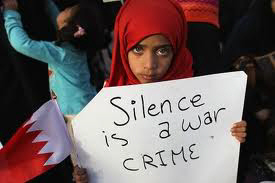The UN, the EU, Britain, France, and human rights groups have criticized a Bahraini court decision upholding prison terms for 13 pro-democracy activists
The UN, the EU, Britain, France, and human rights groups have criticized a Bahraini court decision upholding prison terms for 13 pro-democracy activists, including eight life sentences.
UN Secretary General Ban Ki-moon “deeply regrets the decision of Bahrain's Court of Cassation on January 7 to uphold the harsh sentences, including life imprisonment" for against the activists, the UN chief’s spokesman said.
"He reiterates his firm belief that the only way to promote peace, stability, justice and prosperity in Bahrain is through a national dialogue which addresses the legitimate aspirations of all Bahrainis," Martin Nesirky stated.
"The secretary general also calls on the government of Bahrain to follow through on its recently reiterated commitment to judicial reform," he added.
The European Union also criticized the court ruling, saying the pro-democracy activists should be given amnesty.
"The EU has repeatedly asked the Bahraini authorities to consider an amnesty for all those arrested last year and tried on charges relating to the expression of their political opinion," the spokesman of EU foreign policy chief Catherine Ashton, Michael Mann, said. Mann stated that the EU "fully respects the independence of the Bahraini judiciary" but "remains concerned about the lack of advancement of national reconciliation."
Joe Stork, the deputy director of Human Rights Watch's Middle East and North Africa division, said the Bahraini court "has proven its inability to protect the most basic rights guaranteed in Bahrain's constitution and the international treaties it has signed."
"The mind-boggling verdicts in these cases did not mention a single recognizable criminal offence, instead pointing to speeches the defendants made, meetings they attended, and their calls for peaceful street protests in February and March 2011," he said in a statement.
Stork said HRW’s own investigation into these cases found that the evidence consisted of public statements "advocating reforms to curtail the power of the ruling Al Khalifa family and confessions that appeared to have been coerced while the defendants were [held] in incommunicado detention."
Amnesty International said the ruling underlined "flaws" in the Bahraini justice system and the activists should be freed.
"This unjust decision will confirm the view of many that the judiciary is more concerned about toeing the government's line than upholding the rule of law and the rights of all Bahrainis," said Hassiba Hadj Sahraoui, the deputy director of Amnesty International's Middle East and North Africa division.
France and Britain also criticized the Bahraini court ruling and expressed their “regret” and “dismay” over the decision.
On Monday, Bahrain’s highest court rejected the jailed activists' appeal and upheld their sentences for their roles in anti-regime protests in 2011.
